- Home
- Deborah Harkness
Time's Convert Page 45
Time's Convert Read online
Page 45
* * *
—
THE DEATHS BEGAN WITH MOLLY. Her body was found in the bayou, her neck savagely torn.
“Alligators,” the city coroner said.
Juliette smiled, her teeth hard and white.
Within a few days, Marcus knew that it wasn’t alligators who were disposing of his family, one by one. All died in mysterious circumstances that suggested the Chauncey family of Coliseum Street was experiencing a colossal streak of bad fortune.
Marcus knew it wasn’t Lady Luck who was doing this evil work. It was Juliette. And Matthew.
Marcus could tell which kills belonged to which creature. Juliette’s showed an element of savagery, with gaping wounds and signs of a struggle. Matthew’s were surgical, precise. One fast, quick cut from ear to ear across the throat.
Like Vanderslice.
“There will be no more children,” Matthew told Marcus, when only a handful of his children, including Ransome, remained. All were in hiding, most of them far out of town. “Philippe gave you strict orders on this subject.”
“Tell grandfather his message was received.” Marcus sat, head in his hands, at the same table that he had gathered around with his family, telling tales and swapping insults, long into the New Orleans night.
“Tragic,” Juliette said. “Such a needless loss of life.”
Marcus snarled at her, daring her to continue. Wisely, she turned away. Had she not, Marcus would have ripped her heart out and let Matthew feast on his bones if he wished.
“I will never forgive you for this,” Marcus promised Matthew.
“I don’t expect you to,” Matthew said. “But it had to be done.”
33
Sixty
11 JULY
Finally, after two months, Miriam’s vampire blood was beginning to take root in Phoebe’s body. Some of the physical and emotional changes were subtle—so much so that Phoebe herself wasn’t always able to perceive them right away. There were moments, like the night she met Stella by the Seine, when her altered blood had been obvious. Most days, however, Phoebe looked into the mirror and saw the same face she’d always seen looking back at her.
As she approached the fledgling stage of vampire development, however, it was becoming increasingly clear that she was no longer a warmblood. Her five senses had all become laser sharp and precise. There was no such thing, for example, as background noise for a vampire. She could hear a cricket as loudly as though it were a brass band. Conversations held on mobile phones, all of which seemed to be undertaken at maximum volume, infringed on her sanity so much that she had to resist the impulse to rip the devices out of people’s hands and stomp on them. But music—oh, music was a delight. No one had told her how music would become something so utterly enrapturing. When Phoebe heard a song of any sort—classical, pop, it didn’t matter—she felt as though the notes had replaced the blood in her veins.
Phoebe could now classify the information coming through her nose into the same five categories that warmbloods used for tastes: sweet, salty, sour, bitter, and savory. Phoebe knew simply from smelling an animal or a person what they would taste like, and whether or not she would enjoy feeding from them. It was far more humane to sniff than to bite, and raised fewer human eyebrows.
Witches, Phoebe discovered while walking along the rue Maître Albert with Jason, smelled almost saccharine. Though she had a sweet tooth, and still enjoyed standing outside the window at Ladurée to smell the macarons and see the beautiful colors, the scent of witches turned Phoebe’s stomach. She wasn’t sure how she was going to endure spending time with Diana. Perhaps one became less sensitive to such a powerful odor, or became more aware of its top and bottom notes, like a fine perfume?
Phoebe’s memory had changed along with her senses. Instead of becoming sharper, however, it had grown fuzzier and more fragmented. Once she could recall precisely what color she wore on her birthday ten years ago, how much every handbag she owned had cost, and the titles (in accepted chronological order) for every canvas Renoir ever painted. Now she couldn’t remember Freyja’s mobile number from one hour to the next.
“What is wrong with me?” Phoebe had asked Françoise after she couldn’t find her glasses. “I want to take Persephone into the garden and it’s too bright out.”
It was eight in the morning and overcast, but Phoebe still found the light hurt her eyes.
With Françoise’s help she located the glasses, but then misplaced Persephone. The two of them were reunited in the laundry room, where Persephone napped in a basket full of Miriam’s dirty clothes.
“All manjasang have trouble with their memories,” Françoise said. “What did you expect? You have too many now for one brain to hold. It will get worse the longer you live.”
“Really?” Nobody had told Phoebe that. “How am I supposed to go back to work?” A sharp memory was crucial for someone working with fine art. You had to be able to recall stylistic differences, changes in techniques and materials, and more.
Françoise gave her a pitying look.
“I am going back to work,” Phoebe said firmly.
“So you say.” Françoise tucked one of Miriam’s T-shirts around Persephone like a blanket. It read COUTURE IS AN ATTITUDE, a sentiment with which Freyja did not agree.
Phoebe was finding that being a vampire, like most things in life, was a delicate balance of gains and losses. With every loss, be it temporary like her job or permanent like the taste of ice cream, there were gains.
One day, Françoise found Phoebe studying the latest mark she’d made on the doorframe. To Phoebe’s relief, she had grown a full inch.
“Your teacher is here,” Françoise said, delivering a freshly laundered pair of ballet tights and a leotard.
“I’ll be down in a minute,” Phoebe replied, noting the date on the doorframe in red ink. Freyja had asked her to stop scratching the wood in favor of a felt-tip marker that smelled of cherries and unidentifiable chemicals. “I’ve grown, Françoise.”
“You still have a long way to go,” Françoise replied.
“I know, I know,” Phoebe said with a laugh. Françoise was not talking about her height. Even so, Françoise’s criticisms did not sting as they once had.
“Do you need help?” Françoise asked.
“No.” Phoebe could manage dressing herself now without popping all the buttons off her blouses and buggering up the zippers.
She peeled off her pajamas and bathrobe. Both were silk and kept her from waking up at night itchy and raw-skinned. Phoebe was still uncommonly sensitive, even when compared to other young vampires. Fabric, light, sound—they all had the potential to make her irritable. But Phoebe was now aware of these triggers and was able to manage them most days.
Phoebe slid the tights over her legs, keeping her fingernails free of the mended patches that reminded her of previous attempts to wrestle with the slippery nylon and Lycra. This time she got the blush-colored hosiery on without a snag, a hole, or a wrinkle. Next came the black leotard with its skinny straps that went over her shoulders. They’d snapped in two several times and been replaced. Phoebe adjusted them so that the neckline of the leotard fit properly. Then she checked her silhouette in the mirror and picked up her toe shoes.
She’d been taking classes with a tiny Russian vampire with long legs and big eyes for several weeks now. Phoebe and Madame Elena practiced in the mirrored ballroom, which had excellent acoustics and a resilient wooden floor. Madame Elena’s son, Dimitri, a mousy-looking vampire who appeared to be in his early thirties, accompanied them, pounding on the keys of Freyja’s grand piano with a determined air.
Ballet had been an important part of Phoebe’s childhood, but she hadn’t touched a tutu for more than a decade. Though she had adored the music and the calming rituals of getting ready and doing warm-up exercises at the barre, followed by the exhilaration of jumping and turning,
her teachers hadn’t thought she showed much promise as a dancer. Both Phoebe and Stella liked to excel at their activities, and Phoebe had moved on to tennis instead. At the time, she felt there was no point spending so much time on something she would never be good at. Now she had nothing but time.
After the incident with Stella, Freyja had thought that Phoebe needed a wider social circle and more exercise to smooth out her volatile moods. To everyone’s surprise, Madame Elena had a passing acquaintance with Phoebe’s childhood ballet mistress, Madame Olga.
“Good arms, terrible feet,” Madame Elena had said with some regret.
In Freyja’s ballroom, inscribing delicate circles with her toe and stretching out her vampire limbs, Phoebe was able to work her body to the point where it almost felt like she’d done some exercise. After a steady ninety minutes of controlled movement combined with the grandest of jetés and an exhilarating series of fouetté turns, Phoebe was pleasantly relaxed and her muscles ached. The aches and pains, she knew, would disappear in a matter of minutes.
“You are making progress, mademoiselle,” Madame Elena told her. “Your timing is still abominable, and you must remember to turn out from the hips, not the knees, or you will break your legs in two.”
“Yes, madame.” No matter what Madame Elena said, Phoebe agreed with her so that the woman would return.
She waved Madame Elena and Dimitri off, remaining safely in the shadowed confines of the front hall where the light would not reach her. All that time among the mirrors with Madame Elena had given Phoebe a headache, and she put on her dark glasses again.
“How was your lesson?” Freyja asked.
“Wonderful,” Phoebe said, riffling through the mail on the table. There was no mail for her. There wouldn’t be until after ninety days had passed. Still, it was her habit to check. “Where’s Miriam?”
“At the Sorbonne. Some conference,” Freyja said, airily dismissive. She linked arms with Phoebe, and the two strolled toward the back of the house, where Phoebe had taken possession of a room that overlooked the garden.
Freyja felt every female vampire should have a space of her own in the home that was set apart from the boudoir where she slept, bathed, and entertained intimate visitors. With twenty-four hours to fill, it was important to develop routines that moved one about and gave structure and substance to the day. At Freyja’s insistence, Phoebe had gathered up some of her favorite things in the house and taken them down to the old morning room, now known to all as “Phoebe’s study.” The Roman vase was there that used to be in the front hall, as well as a particularly nice Renoir that reminded her of how she felt when she was with Marcus. It was soft and sensual, and the dark-haired woman picking roses looked a bit like her.
“You finished your painting!” Freyja exclaimed, looking at the canvas propped on the easel.
“Not quite,” Phoebe said, casting a practiced, critical glance over the work. “The background needs adjusting, and I think the light is still too strong.”
“You think all light is too strong, Phoebe, and yet you are drawn to it in your art as well as in your life.” Freyja inspected the painting closely. “It’s really quite good, you know.”
Like ballet, painting was something Phoebe was pleased to pick back up.
“What I’m learning will be a huge help when I go back to work. To Sotheby’s.” Phoebe tilted her head this way and that to change her perspective on the piece.
“Oh, Phoebe.” Freyja looked sad. “You know you will never work at Sotheby’s again.”
“So you all say. But I’m going to have to do something other than paint and dance, or I’ll go mad,” Phoebe said. “You may have been a princess, Freyja. I never was.”
“We shall find you some good causes,” Freyja said. “They will occupy your time. You can build schools, join the police, take care of widows. I do all of those things, and they make me feel useful.”
“I don’t think I’m police material, Freyja,” Phoebe teased. She was growing fonder of Marcus’s aunt with each passing day.
“You didn’t think you’d remembered how to plié,” Freyja reminded her. “You never know where the path of your life will take you.”
“There’s always Baldwin’s collection to catalog, I suppose,” Phoebe replied. “Not to mention making an inventory of Pickering Place. And Sept-Tours.”
“You can make a list of everything in my house when you are finished with those. And don’t forget to take a look Matthew’s house in Amsterdam. The attics are filled with the most enormous canvases covered with dead white men in ruffs.”
Having seen some of the places where Matthew kept his art, which included the downstairs loo at the Old Lodge, Phoebe wasn’t surprised.
“But you must do more than hunt for treasure, Phoebe dear,” Freyja warned. “You cannot save the world or everyone in it, but you must find a way to make a difference. My father always said that was what vampires were put on earth to do.”
34
Life Is But a Breath
16 JULY
We were just finishing up with the twins’ baths when Marcus rocketed into the room. Marthe was steps behind, looking concerned.
“Edward Taylor’s in the hospital,” Marcus said to Matthew. “Freyja says it’s a heart attack. She won’t tell me where he is, or his condition.”
Matthew handed Philip’s towel to Marcus before taking out his phone.
“Miriam?” Matthew asked when it connected. He put it on speaker so we could all listen in.
“Freyja shouldn’t have called you, Marcus,” Miriam said sourly.
“Where is Edward now?” Matthew asked.
“The Salpêtrière,” Miriam replied. “It was closest to the flat.”
“His condition?” Matthew said.
Miriam fell silent.
“His condition, Miriam,” Matthew repeated.
“It’s too early to say. It was a major episode. Once we know more, we’ll decide whether or not to tell Phoebe,” Miriam said.
“Phoebe has a right to know that her father is gravely ill!” Marcus said.
“No, Marcus. Phoebe has no rights when it comes to her human family—and I have a responsibility to make sure that my daughter is not a danger to herself or others. A hospital? She’s sixty days old!” Miriam replied. “And she’s still lightstruck. The Salpêtrière is lit up like a Christmas tree at all hours of the day and night. She wouldn’t be safe there.”
“Can Edward be moved?” Matthew was thinking outside of the box of ordinary warmblooded medical options. If need be, he would transform Freyja’s house into a clinic, outfit it with the finest equipment, hire the most advanced cardiac surgeon in the world, and make Edward the facility’s sole patient.
“Not without killing him,” Miriam said bluntly. “Padma already asked. She wanted him moved to London. The doctors refused.”
“I’m coming to Paris.” Marcus tossed Philip’s towel aside, leaving the baby standing, naked and pink after his bath, holding a plastic duck. Marthe hurried toward him and helped him into his pajamas.
“You’re not welcome here, Marcus,” Miriam said.
“Story of my life,” Marcus replied. “But Edward is Phoebe’s father, so you can imagine how little a warm reception from you matters at this moment.”
“We’ll be there in four hours,” Matthew said.
“We?” Miriam swore. “No, Matthew. That’s not—”
Matthew disconnected the call and looked to me. “Are you coming, mon coeur? We might need your help.”
I had finished getting Becca into her pajamas, and handed her off to Marthe.
“Let’s go,” I said, taking Matthew by the hand.
* * *
—
MARCUS’S CONCERN FOR PHOEBE, and Matthew’s steady foot on the accelerator carried us to the outskirts of Paris in a little over three hour
s. Once there, Matthew zipped along streets that no tourist ever found, taking every shortcut until we reached the ancient university quarter near the Sorbonne and the Salpêtrière hospital. Matthew turned off the engine and spun around to face his son in the backseat.
“What’s the plan?” he asked.
We’d had none up to this point—other than reaching Paris as quickly as possible. Marcus looked startled.
“I don’t know. What do you think we should do?”
Matthew shook his head. “Phoebe is your mate, not mine. It’s up to you.”
I loved Matthew with all my heart, and was often proud of the quiet perseverance with which he handled the many challenges that faced him. But I had never been so overwhelmed with pride as I was in this moment, idling on a Paris street in the 13th arrondissement, waiting for his son to make his own decision.
“Freyja called me because I’m a doctor,” Marcus said, staring up at the bulk of the hospital. “So are you. One of us should go check on Edward, and make sure that he is being taken care of properly.”
I thought it unlikely that a British diplomat, taken by ambulance to one of the finest hospitals in the world, would be treated improperly, but held my tongue.
“And I don’t give a toss what Miriam thinks. Phoebe needs to know what’s happened. And she needs to be here, at her father’s side,” Marcus said, “just in case.”
Still, Matthew waited.
“You deal with the doctors,” Marcus said, hopping out of the backseat. “Diana and I will tell Phoebe.”
“Wise decision,” Matthew said, yielding his place behind the wheel to his son.
Matthew circled the car. I pushed the button, and the window went down.
“Take care of him,” Matthew murmured before he pressed his lips to mine.
* * *
—
MIRIAM WAS WAITING FOR US on the front step when we arrived at Freyja’s house. I had never been there before, and was struck by its grandeur as well as its privacy.

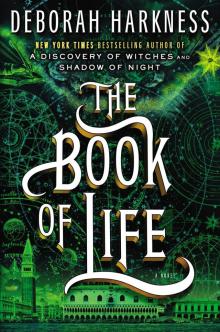 The Book of Life
The Book of Life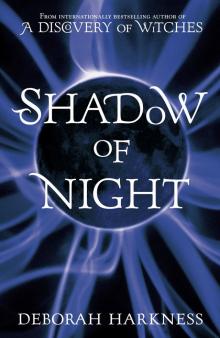 Shadow of Night
Shadow of Night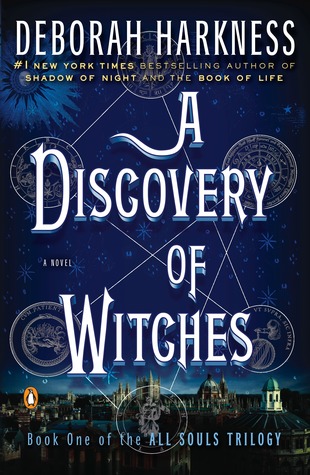 A Discovery of Witches
A Discovery of Witches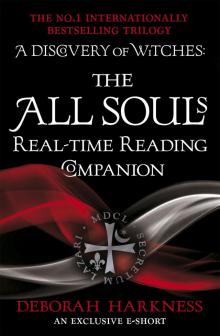 The All Souls Real-Time Reading Companion
The All Souls Real-Time Reading Companion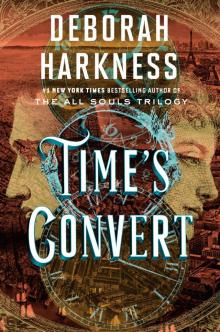 Time's Convert
Time's Convert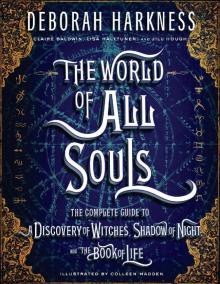 The World of All Souls
The World of All Souls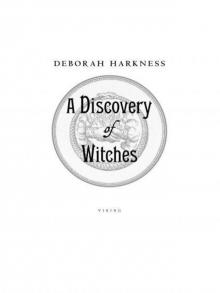 A Discovery of Witches: A Novel (All Souls Trilogy)
A Discovery of Witches: A Novel (All Souls Trilogy)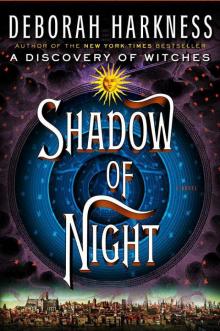 Shadow of Night: A Novel
Shadow of Night: A Novel